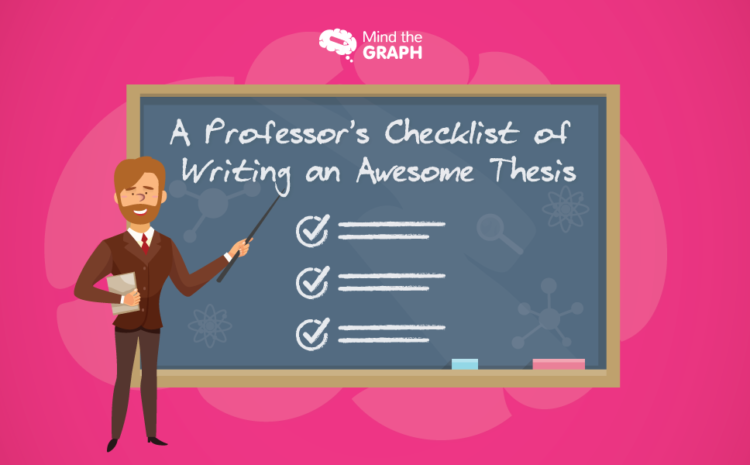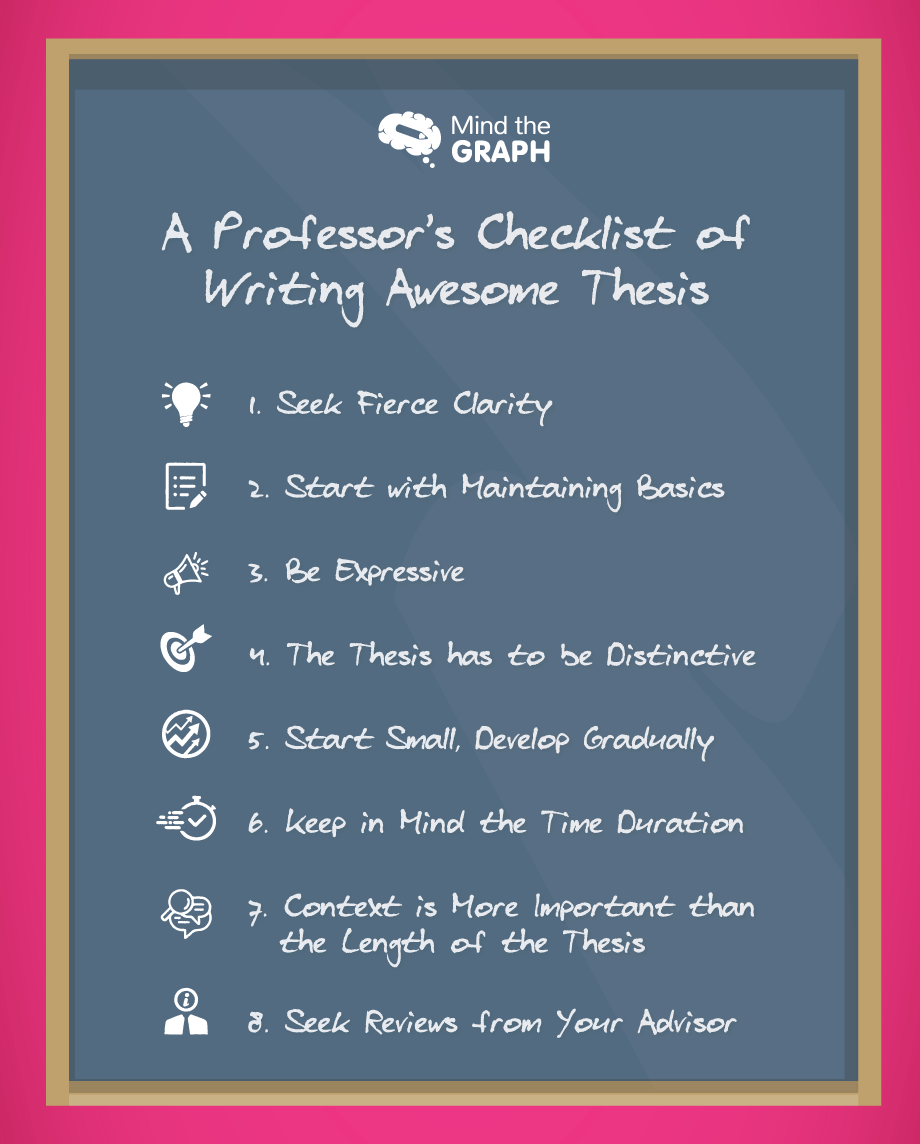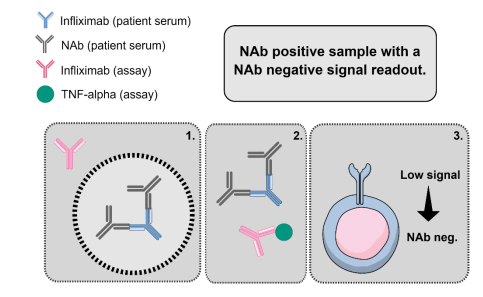A thesis is a document that is submitted to support a statement based on your ideas and research. A thesis is written in a way such that it intends to prove a point that you believe in.
Let’s face it, writing a thesis is a huge struggle. It is probably the toughest piece that you are ever going to write. Starting a thesis, structuring it well, and making it as comprehensive as possible may seem quite daunting.
Nevertheless, thesis writing is an art that every student needs to master. A good thesis determines and impacts your authority as a subject matter expert. And obviously, it can also fetch you good grades.
Writing a thesis that impresses your professors may seem like a far-fetched dream. But what if you knew exactly what a professor looks for while evaluating your thesis? Worry not, we have got you covered.
As a professor, I have laid out a comprehensive checklist of what we expect from any student’s thesis.
Using this checklist, you’ll get a fair idea of what goes on in professors’ minds when we evaluate your thesis. And, you can use these actionable tips to truly impress your professors and get good grades.
-
1. Seek Fierce Clarity
There is no point in writing a thesis that doesn’t throw light on what you are exactly meaning to talk about. Hence, this obviously comes on top of any professor’s checklist for writing a thesis.
Here are a few points to have in mind:
- Writing a thesis requires a lot of planning and research skills before you actually sit down to write. Be clear on your topic and conduct in-depth research before you begin writing.
- Try to gather as much knowledge on the topic as possible. If you are not entirely clear on the thesis topic, chances are that your writing won’t be clear as well.
- Structure your thesis well. Be clear on every part of it. Ensure that you present all your findings in a crisp and clear manner. Avoid extended paragraphs and unnecessary fluff that will reduce the quality of your thesis.
- Also, make sure that your entire thesis comes together in such a way that it makes sense. Having a flow and cohesion in your thesis is important.
You might not notice this going wrong while writing. It is better to go through your thesis, in the end, to ensure that it makes sense and that there are no open loops.
-
2. Start with Maintaining Basics
Although the main meat of your thesis is important, you shouldn’t ignore the basics that form the foundation. Basics include things such as your thesis cover page, abstract, table of contents, and similar more.
Here are a few tips to ensure that you have got your thesis’ basics right:
- The title page or the cover page of your thesis makes the first and most impactful impression on your readers. Hence, it is super-important to make it as attractive as possible.
You can use a scientific graphic design tool such as Mind the Graph to give your cover page a catchy and professional look. Using Mind the Graph, you can create graphs online with absolute ease. - Ensure that your thesis has a strong and representative title that perfectly complements it.
- An abstract is used to give first-time-readers a fair idea about your thesis. It should give a gist about your research and findings.
Anyone who doesn’t go through your entire thesis should still be able to get an overview of your thesis just by going through your abstract. Hence, it should be standalone. - The table of contents is also a key part of your thesis. More often than not, readers will go through your table of contents to read about their topics of interest.
- We, as professors, try to go through the table of contents to get an understanding of the contents of your thesis. Hence ensure that you present it in a precise and clear way.
-
3. Be Expressive
You have spent months picking a topic, researching it, and coming up with your findings. And you present all of your efforts in a single document called the thesis.
This means that no matter how hard you have worked on your thesis, at the end of the day, professors and readers are going to judge your work based on your thesis document.
Hence, take it from a professor with years of experience:
- Be expressive when you write your thesis. There is a fine line between being proactive and expressive.
Being expressive does not mean making bold claims or using flair in the language. It simply means that you must put forth all your ideas in the most expressive and simplest language possible. - Images speak louder than words. The same applies to your thesis as well. If you want to captivate the attention of your readers, you should deliver your findings in attractive formats.
These are things that distinguish an experienced professor’s thesis from an amateur student’s thesis. You can do some of the following:
- Use posters and images that depict your findings in the most precise way possible.
- You may consider roping in a graphic designer to design some creatives for your thesis.
- Or, one of the simplest yet effective options is to create graphs online using an easy-to-use tool such as MindTheGraph. You don’t have to invest in a graphic designer and you can customize it to fit your needs.
-
4. The Thesis has to Be Distinctive
Students often try to claim that their study will change the world. Although it is good to sound confident, you might be going overboard with your idea.
Ensure that you stick to the following tips to create a thesis that is distinctive:
Students often try to claim that their study will change the world. Although it is good to sound confident, you might be going overboard with your idea.
Ensure that you stick to the following tips to create a thesis that is distinctive:
- We, professors, have gone through hundreds of thesis in our lives. And let me tell you that we always look for simple, yet thought-provoking ideas.
Sounding overly boastful in your thesis should be a strict no. The idea is to write a thesis that strikes a chord with the reader. Going over the top is never the right way to write your thesis. - Instead, try to make your thesis as concrete and practical as possible. Remember that a small but practical idea always beats a massive idea that is impractical.
- The uniqueness and practicality of a thesis also lie in its representation. Adding graphics to your thesis will definitely make it more distinctive. You can easily do this by creating graphic design graphs online and adding it to the right places in your thesis.
- After going through numerous thesis, we look for the ones that are distinctive and have your unique thoughts added to it. Writing your thesis with this in mind is the best way to make it stand out.
5. Start Small, Develop Gradually
More often than not, students repeat the same mistake. Which is to start writing their thesis just a few days before their deadline.
Your research is probably the most significant part of your career, and your thesis is a medium of presenting your entire research. Hence, it is not something that you start writing at the last moment.
- Writing a thesis is a creative process. It takes a lot of time and brainstorming. It’s not a simple school essay which you can complete overnight. Therefore, professors would always advise you to start small and work on your thesis gradually.
- Your initial draft would not be the nicest and most organized piece of writing. It will probably be jumbled and without a proper structure. But it is okay for the first draft of your thesis to look this way.
- With more iterations, you’ll come up with the final draft that would look more like an actual thesis. Keeping this in mind, you must try to complete your first draft way before your deadline. This will give you plenty of time to improve the final outcome.
- Moreover, it is highly likely that halfway through the process of writing, you realize that you need to do some more homework about a topic. This may be because you might feel that certain areas or topics need to be rewritten in a more comprehensive manner.
6. Keep in Mind the Time Duration
Planning and research are one of the most crucial parts of writing a thesis. As professors, we don’t expect our students to have mastered the art of time management.
But, by taking a look at a thesis we understand whether the thesis has been written in a rush or has it been written in a well-thought-out and planned manner.
Here are a few things to keep in mind that will help you stick to your thesis deadline:
- Plan your timelines well in advance. Ensure that you set a deadline for your thesis writing which is way before your actual thesis submission deadline. This will give you ample time to hit the actual deadline even if things start to go sideways.
- Instead of having just one single deadline for the entire thesis, break it down into smaller chunks. For instance, set separate deadlines for writing each chapter or topic. This way, you’ll be able to complete way before the deadline, thus avoiding overwhelm.
- No matter how good your research is, if you don’t spend time presenting in an appealing way, professors are not going to give you good grades. Hence, do not rush through the writing process. Give yourself the bandwidth to be more creative and expressive.
7. Context is more Important than the Length of the Thesis
Professors come across many theses that look like never-ending novels. Trust me when I say this, the length of your thesis is not as important as the context.
As students, you might feel the urge to dive too deep into topics. You might feel like writing many unnecessary things that do not actually add any value to the core idea.
The point is never to fill more and more pages. Instead, you should always aim for presenting your findings in a short and crisp format.
Here are a few tips to stress more on the context rather than the length of your thesis:
- Always plan the structure of your thesis before you start writing. A thesis structure would be like a blueprint that will guide you throughout the writing process.
It will stop you from unnecessarily deviating from the topics that you want to include in your thesis. - Remember to go through your thesis multiple times before your final submission. Chances are, you will notice that you have extended some topics way more than they should have been.
- Be mindful of how much you are covering for every topic and subtopic. The last thing you want is for your thesis to look like a fiction novel. Professors do not find that appealing and you’ll end up getting not-so-good grades.
8. Seek Reviews from your Advisor
As professors, we understand that thesis writing might be a challenging and daunting task for most students. We do not expect the level of expertise that a professor would bring into their thesis.
However, there certainly are some ways in which students can write a high-quality thesis. And one such way is seeking reviews from your advisors.
- One major thing that would be of help is to keep in constant touch with your advisors. This will help your thesis review process a lot smoother and easier.
- Keeping in contact with your advisors will give you the leverage to make your advisors a part of your thesis creation process. It will be super-helpful to have an expert’s hand in your thesis.
- Possibilities are that you’ll face a lot of challenges and hurdles while writing your thesis. You may get stuck in many places.
You might not always find solutions to these concerns from fellow students. Hence, your advisor can always pitch in their ideas about how you can proceed further with your thesis.
Conclusion
Writing a thesis requires a special kind of attention and expertise unlike other forms of writing. So, students must put in their best efforts and pay attention to every minute detail of the thesis.
Students often have a different kind of idea about thesis writing in their minds. Most students feel that filling in pages and pages of your thesis is what gets you good grades. But, that is nowhere near the truth.
Hopefully, this guide on the professor’s checklist for writing a good quality thesis sheds light on some of the common misconceptions about thesis writing.
So, start taking notes now. Implementing these ideas into your thesis would be a good start to the long journey ahead of you.

Subscribe to our newsletter
Exclusive high quality content about effective visual
communication in science.












